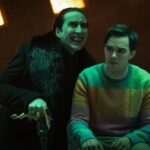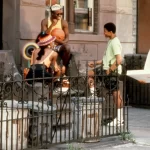Elvis & Nixon: You Can’t Have It Both Ways, by Tyler Smith
In 1970, Elvis Presley visited the White House and met Richard Nixon. He did this so that he might be appointed a federal agent-at-large. Not many people knew what this meant, but when the King wants something, he gets it; not even presidents can say no. This whole affair is so inherently ridiculous and fascinating that the very fact of it is hilarious. Once upon a time, two of the biggest, most-imitated public figures in American history met up in an unlikely way for an even more unlikely reason. This could be the stuff of a delightful film comedy, or a real opportunity to examine both men and what could have driven them to meet up. Liza Johnson’s Elvis & Nixon tries to do both, and winds up with a film that is intermittently interesting, but then veers off into parody and silliness. The resulting film is uneven and, ultimately, unsatisfying.
The thrust of the story has more to do with Elvis’ friends and Nixon’s staff members trying to make the meeting happen than what is discussed in the meeting itself. Initially, it would seem that these lackeys would be at odds with each other, with the White House staff being particularly resistant to this possibility. However, everybody understands the benefit. Elvis is placated and Nixon gets a nice boost to his public image. As they scramble to get their ducks in a row, Elvis wanders around Washington D.C. and contemplates the nature of his fame and the man he used to be.
It’s clear that Liza Johnson is genuinely interested in what must have been happening inside Elvis during this strange event, and the film goes out of its way to avoid caricature. Rather than the eccentric, charismatic Elvis that we’ve all come to know, we get a quiet, introspective man, ably played by Michael Shannon. Despite his big hair and outlandish clothes, Elvis is portrayed as a simple country boy who got lucky and found himself in the spotlight for most of his life. And his desire to be a federal agent seems to stem from a deep longing to do something that matters; to make a real difference in this life.
It is in these moments with Elvis that the film shows moments of inspiration, when it really wants to dive into the nature of fame. There is only one reason that Elvis is in the Oval Office with the most powerful man in the world, and that is because he is famous. This fact is clear to everybody in the film. And Elvis himself is allowed a nice moment of reflection – if a bit too on-the-nose – about how his image has taken on a life of its own. And it is that image that Nixon’s cronies are interested in. While Elvis may be delusional in his goals, they seem to come from a very real and human desire to make the world a better place. Nixon, however, who actually is in a position to make the world a better place, isn’t truly interested in anything Elvis has to say; he just wants a photo with the sideburns and the glasses and the goofy outfit. Fame got Elvis in the door, but it didn’t get him taken seriously.
Shannon brings a lot of gravity to the part, and it is often effective. We see hints of Elvis’ odd behavior from time to time, but those are played down so that we might look deeper. The problem with this is that the director occasionally remembers that she’s making a comedy, and will then have Elvis act out in a goofy and irrational way. These happen so abruptly that it interrupts the nuanced performance that Shannon is turning in. He does his best to bring these disparate elements together and make them spring from the same place, but the script doesn’t do him any favors. Nonetheless, like many of Shannon’s characters, Elvis comes across as sensitive, but a little crazy, and the film clearly has affection for him.
This is most certainly not the case with Richard Nixon, who is not allowed the introspective moments that Elvis is. In a film in which characters are regularly talking about Nixon’s image problem, there was an opportunity to have the deeply insecure president contemplate what it is about him that people detest so much. The film could have been an opportunity to, like it does with Elvis, mostly brush aside Nixon’s well-known mannerisms and cadence and try to look at the man underneath. Unfortunately, the director is not interested in this and simply instructs Kevin Spacey to do a Nixon impression as he bloviates and swears and shows himself to be generally clueless. Spacey doesn’t seem particularly interested in bringing any real humanity to Nixon, and the character, while occasionally entertaining, remains frustratingly two-dimensional.
It is in the writing of these two men that we see where the film is at war with itself. Had Johnson and her writers been truly interested in exploring the men behind the famous photograph, they could have made a surprisingly compelling – and, yes, occasionally amusing – character study. Or they could have played up the silliness of the meeting and turned it into a living cartoon. That probably would have been less satisfying, but at least it would have been consistent.
Instead, we have a film that never seems to know which direction it wants to go, so it tries to go both ways. Elvis & Nixon had a lot of material to work with, and could have been a memorable and interesting portrait of an unusual event in American history. It could have done this by picking a clear perspective and following that path. Instead, it tries to be everything. And, in doing so, it winds up being nothing.






























